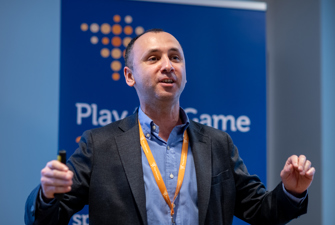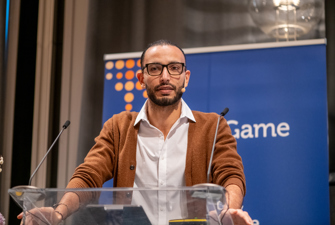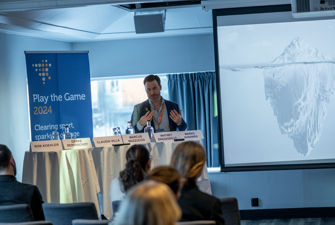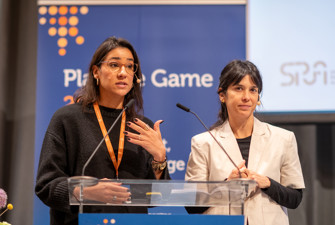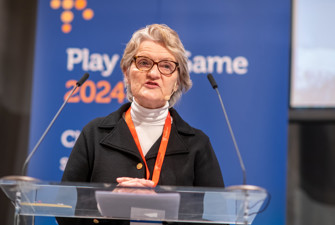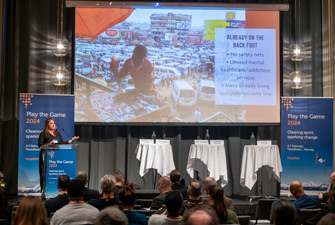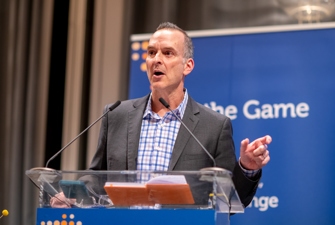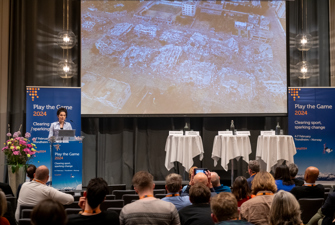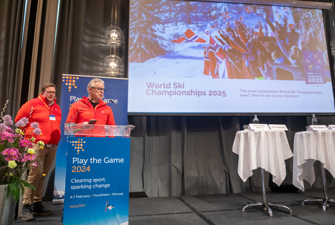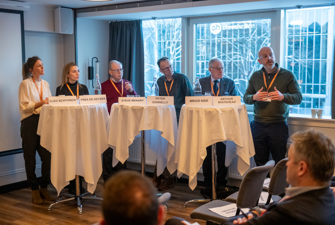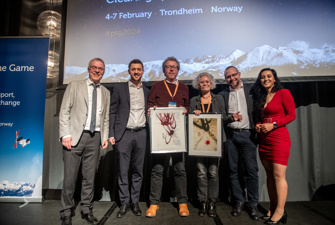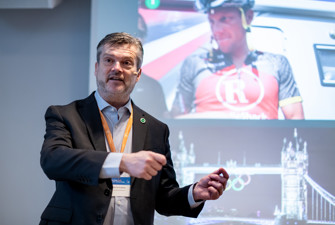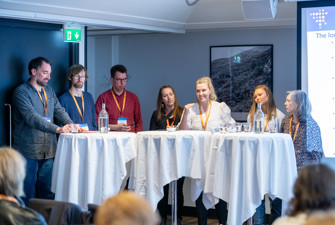Healing through compassion – my journey of navigating trauma
SPEECH: During the opening session at Play the Game 2024, the Brazilian Olympian Joanna Maranhão gave a moving keynote presentation, sharing her story as a swimmer experiencing abuse and her journey of navigating the trauma it caused.
Joanna Maranhão is a former Olympic swimmer from Brazil, and is now a network coordinator at the Sport & Rights Alliance.
Watch her speech below the text.
Good morning/afternoon, everyone.
It’s great to see so many familiar faces, it makes these speeches both a little easier and harder.
In a sense that, when I was invited by Stanis and Play the Game organization to open such an important conference, I was asked to speak about my story and the work I’ve been doing.
Although it’s a lot easier these days to go back to my story since I am able to control, to some extent, the triggering, I am always afraid of sounding arrogant or that these speeches are nothing but an ego trip.
So, for those who are familiar with my story, please bear with me. I might share some points that you have heard before but, the fact that I’ve been invited a couple of times to speak on my journey is also a sign that there’s interest, that we are starting to care and that we are slowly willing to tackle the issue.
For those who might be asking “who the heck are you and why do you think I should know who you are”. You shouldn’t. Because the truth is that the second part of my story which I shall share with you should not exist. And most of all, should not relate and be similar to so many others.
My name is Joanna Maranhao and I come from Brazil. For safety reasons and to make sure that I would put my energy into something that wasn’t messing up the house, I was enrolled in swimming lessons at age three. So did my old and the younger brother. No one in the family have been an athlete, so there was no projection, no other goals than ensuring that I was able to swim in the ocean with no risks.
But I think it was meant to be, I loved that environment, not so much the socialization (let me share a secret: I really enjoy my own company) so I was in the perfect sport, right? Head in the water, mastering the strokes, improving my technique. That made me curious, curious to know where that could take me.
My family understood right away that I was into it, so they went onboard. The whole process was new to all of us. Competitions became a family gathering and they were all in the stands cheering for that cross eyed girl who seemed to be having loads of fun.
And I really was.
Coaches started to see me and praise my technique. It felt good to hear that. It felt even better to challenge my body into harder workouts. I loved beating the guys in practice, it felt awesome, to be honest.
But anyways, at that point I had only seen the Olympics on the TV. I saw Dara Torres, a north American swimmer and it blew my mind. How fast she was, how confident, how powerful. I said to myself “one day I’ll go there”.
So, it clicked. It was obvious to me that: in order to make it all the way to the Games, my life could not be like my school friends. I don’t know what it is like to go to a friend’s house after school because I wanted to get some rest before practice. I was that kind of child athlete. No one, and I repeat, no one forced me to train hard. I simply just wanted to challenge myself.
The hard work started to pay off, I did feel pressured, my parents had conversations if whether I was taking it too seriously but they respected my choices. Coaches became saints and I would follow everything they would say. They were the ones who could help me to get where I wanted, right?
And I did get there. Not once, but four times. Representing my country in four editions of the Olympic games was a blessing. I know we all have concerns about the Olympic movement and all the ethical discussions around it, but problems aside, it is awesome experience. Walking to that lane 7 at the finals of the 400 in 2004 is a moment I’ll cherish forever.
Well, what I’ve shared with you should be the biggest part of my career. But it was not.
Although I’ve lived so many great experiences in swimming, I’ve also lived the worst. Remember that I spoke on the level of respect I’ve put into my coaches? Yes. I still believe that coaches are a fundamental part of this journey. But one of them took it to another level.
At age nine I was severely and systematically sexually abused by the man who had the obligation to take care of me. All the fear, the confusion, the triggering, the pain, and the suffering were kept to myself until it was no longer possible to remain silent.
When the memories from the abuse came back, I was already a professional athlete. Everything I thought I knew about competitive sports was gone.
It felt like I was thrown into a dark tunnel where I couldn’t see the light. I kept walking, but obviously not at the same pace, I became scared, depressed, anxious and grumpy. (well, I am still a bit like that but…) at that time, it felt impossible to keep going.
None of the things I’ve used to do made any sense.
When I tried to kill myself during the process, it was not my life that I was trying to terminate, it was the pain. I loved myself back then, but I didn’t know how to help me.
It was during these moments and this painful process I started to reflect, and I came to realize that I had two choices: I would either quit swimming and try to do something else with my life or I would shift my focus on the sport I love and that had been such a big part of my life until then.
Thankfully I chose option number two.
Giving up sports would make him win, and I would not give up that easily. Trying to be as competitive and focused and great as I was, would be too much to ask, it would be a lost fight, w/ no rest, and no ending.
So, I slowly decided to be gentle to myself. To compliment myself every time I was able to swim a couple of miles, every time I would control a panic attack in the call room or when I used to have fun during and after a 400 im.
I understand today that this was how I became stronger. By facing and embracing my trauma and my vulnerabilities, it increased my strength.
I’ve publicly disclosed my story and, even though I was unable to prosecute him due to statues of limitations, I was able to advocate for a significant change in Brazilian legislation. I’ve been to the senate, and the congress while also training for the Games and today, victims have double the amount of time to report on incidents of sexual violence.
The fact that the law carries my name is a huge honor but it’s by far not enough. Nothing that I’ll do will ever be enough.
And it’s moved by the urgency to ensure that others don’t go through what I went through while also respecting and honoring 9y Joanna who felt so scared and lonely, that I do what I do.
Unfortunately, this is the biggest part of my athletic career. And the fact that I’m standing here today is because so many athletes and people involved in sports are or have gone through similar or even worse experiences.
To those of you standing here today that experienced violence in the context of sports: I hear you and I honor you. Whether if you have disclosed it or not. You don’t own anyone your story.
In the next couple of days, we’ll discuss many themes around sports. But with all the uncertainties that I carry with me, there’s one thing I am sure of: harassment and abuse is the biggest threat to the integrity of sports.
No other issue is more urgent and under resourced than this.
If we say we love sports, we have a moral obligation to do more. Whether from a research or advocacy perspective because we are miles away from where we should. Sports is not a safe space, there is no sports environment free from harassment and abuse.
We are facing a complex and serious issue. But the complexity doesn’t justify inaction.
One crucial point is the engagement of people with lived experience. It goes beyond a key note speech or a seat at a table full of (most likely) white people with power to make decisions.
Being a victim of violence in the context of sport affects people differently, and different people see those solutions in a different way.
All those voices matter. Especially the most vulnerable. An intersectional approach where a safe and effective engagement is offered is pivotal to change this reality.
I know this is getting too long so I’ll try to wrap up by honoring my colleagues by experience. It’s with huge responsibility that I’ve taken the role to facilitate an international network of solidarity where we can heal and advance our rights. I am aware that I don’t know it all and that my intentions might at some point, impact people negatively. I am and will always be open to hear, learn and honor you. May our network sparkle change and help us to navigate our own stories.
Let us move forward to ensure that a safer world of sport is possible.
Thank you.
